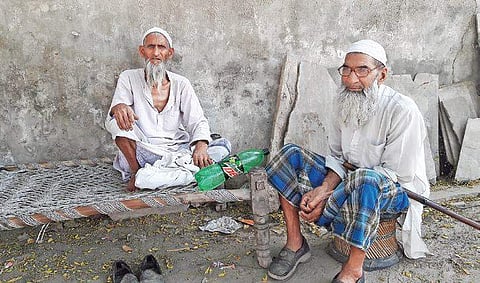

FARIDABAD (HARYANA): “I am born in this village, in India. Why should I go to Pakistan?” Fateh Mohammad said in a low tone. A brief silence ensured before he spoke again.
“They tell us to leave India. Even after so many years of Independence, the people have not accepted the Muslims as a part of the country. But I shouldn’t say all, only some section of people shows hatred towards us.” Fateh lives at Khandawli village in Haryana’s Faridabad, the same locality where Junaid Khan – the teenage boy who was lynched while travelling back from Delhi in local train two years ago — belonged to. The village is barely an hour’s journey by road from Delhi.
The residents of Khandawli haven’t forgotten the cruel memories even today. There is a palpable fear among the people about communal hatred. They are equally scared of speaking or confronting about it. It took much coaxing before the villagers opened up.“Kya faeda kuch bolne ka, jo hota aa raha hai wahi hoga (What’s the point of speaking about communal fear, it will continue as has been the case). The people target us on our looks, our beards and clothes that we wear,” said Fateh, sitting on a cot under a tree along with his childhood friend Abdul Rahim.
Both septuagenarians claimed they are witness to changes in the village – from bad to good and now again ugly. For them, now lynching is a common occurrence. “The RSS has gained power in five years. There is nobody to stop them. They have evoked communal hatred among the people. There are many neighbouring Jat villages which were friendly to us earlier, they never created any trouble. But now they have a sense of superiority as if someone has given them a free hand,” said Abdul.
Abdul, however, noted that blaming the government for inciting lynching and hatred would be wrong. “Government is the same for all, only a section of the people or the group has this habit. But what disappointed us is that this government took no action to stop such activities. No security was ensured. At least, the previous government took steps to stop such incidents,” asserted Fateh.
Not far from Khandawli, lies Nuh district earlier known as Mewat. Nuh was the hometown of Pehlu Khan, who was lynched by a mob of cow vigilantes two years ago in Alwar, Rajasthan. Last year, Rakbar Khan was killed by a mob on suspicion of cow theft. Nuh, which falls under Gurugram constituency, lies near the border of Rajasthan. It has a large number of Muslims who are mostly into cattle rearing. Followed such cases of mob lynching, the villagers said they don’t feel safe of keeping cattle anymore and security for life has become a question.
“If we don’t keep cattle how do we survive then? This is not agricultural land. The village youths neither have a job to help their families, nor any other occupation. Some of the people are into truck driving,” Mohammad Asuda, 62, said.The villagers have become careful about their activities, from the food they eat to where they go. “Darr to hai, magar kya karein…jeena toh chhor nahi sakte (There is fear but what can be done? ). And where do we go away from here? Our families are settled for over five-six decades. We cannot shift to other place. Some families did it,” said Mohsin,28, who lives in Kolgaon village.
What struck this reporter most in these villages of Faridabad and Gurugram was the lack of empathy from the government and the delay in justice. Even at the peak days of the election, parties are yet to visit any of these villages. Haryana votes on May 12.“Media came here more than government officials. Nobody came to talk to us, listen to our issues. So, we cannot even think of solving the crisis. A few days are left for voting, but not a single party leader has shown his face,” said Fateh from Khandawli village.
But not all seemed lost. Some residents said despite lynchings, communal harmony can be maintained if the people are not swayed away by the words of politicians. “Why would anyone hurt another unintentionally unless provoked? Lynching is nothing but an act of provocation by certain people. And anybody, irrespective of religion can be lynched. It is not that only Muslims are being targeted,” asserted Syed Ahmed, a resident of Kholi village in Faridabad. “The people should think on humanitarian grounds, and not how the leaders or politicians speak. Because when such incidents happen it is the common man who is affected and not the leaders.”